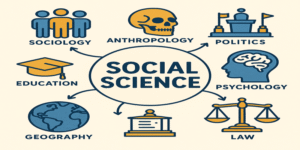Self-discipline stands at the crossroads of success and failure. It is a psychological construct rooted in the capacity to delay gratification, regulate emotions, and maintain commitment to long-term goals despite short-term temptations. This article explores the science behind self-discipline, incorporating insights from psychology, neuroscience, and behavioural science.
Understanding Self-Discipline
Self-discipline can be defined as the ability to override impulses, stay focused on goals, and exhibit consistent behaviours aligned with one’s values and objectives (Baumeister & Tierney, 2011). Unlike fleeting motivation, self-discipline is a sustained and reliable predictor of success, be it in academia, health, or career.
Peter Hollins (2019), in his book The Science of Self-Discipline, emphasises that self-discipline is not an inborn trait but a cultivated skill. Drawing from research on top performers, including elite athletes and military personnel, he argues that disciplined individuals engineer their environments and habits to reduce friction and maximise productivity.
The Biology of Self-Control
Neuroscience provides robust explanations for self-discipline. The prefrontal cortex — the region responsible for planning, decision-making, and impulse control — plays a pivotal role in regulating behaviour (Diamond, 2013). The brain’s reward system, particularly the dopamine pathways, often conflicts with our rational goals, seeking instant gratification from stimuli such as sugary food, social media, or procrastination.
Mischel’s famous “Marshmallow Experiment” with children demonstrated the long-term benefits of delayed gratification. Children who resisted the immediate reward of one marshmallow in favour of two later performed better in life across various domains (Mischel et al., 1989). Hollins (2019) cites this experiment to underscore the importance of emotional and cognitive regulation from an early age.
Habits and Environmental Engineering
Research shows that willpower is a limited resource, but habits can automate self-disciplined behaviours, reducing the need for constant mental effort (Duhigg, 2012). Forming positive routines, such as designated study hours or regular exercise, allows individuals to conserve cognitive energy.
Hollins (2019) explains that self-discipline thrives in environments that reduce temptations. For example, keeping distractions out of sight or surrounding oneself with like-minded peers reinforces discipline. This concept aligns with the nudge theory in behavioural economics, which suggests that subtle changes in choice architecture can promote better decisions (Thaler & Sunstein, 2008).
Psychological Resilience and Mental Toughness
Mental toughness — the capacity to endure adversity, persevere through failure, and maintain emotional control — is another pillar of self-discipline. According to Clough et al. (2002), mentally tough individuals exhibit higher confidence, commitment, control, and challenge orientation. These traits are not only predictive of athletic performance but also academic success and stress management.
Hollins (2019) introduces techniques such as “emotional distancing” and “self-talk” to manage urges and stress. By reframing discomfort and affirming commitment to long-term goals, one can bolster mental toughness.
Self-Awareness and Motivation
Self-discipline is closely tied to self-awareness. Understanding personal triggers, energy patterns, and motivational sources is critical. Deci and Ryan’s (2000) Self-Determination Theory highlights that intrinsic motivation — driven by personal growth or fulfilment — is more sustainable than extrinsic rewards.
Hollins (2019) provides practical tools like journalling, reflection prompts, and the “four-question method” to evaluate moments of failure in willpower. These strategies enhance metacognition and help individuals recalibrate their habits.
Social Influence and Accountability
Humans are inherently social beings, and peer influence can either derail or reinforce discipline. Studies have shown that people tend to adopt behaviours similar to their social circle, including both positive habits like studying and negative ones like procrastination or binge eating (Christakis & Fowler, 2007).
Hollins recommends forming accountability partnerships or joining communities that share one’s values. This aligns with Bandura’s (1986) Social Learning Theory, which posits that behaviours are learned through observation, imitation, and reinforcement within a social context.
Overcoming Instant Gratification
The digital age presents unique challenges to self-discipline, from social media to binge-watching platforms. The constant bombardment of dopamine-inducing stimuli makes it harder to delay gratification. According to Newport (2019), “digital minimalism” — the intentional reduction of screen time — can help reclaim focus and discipline.
Hollins (2019) encourages using the “10-minute rule” — when tempted to indulge, delay the action for 10 minutes. This brief pause allows the rational brain to reassert control over impulsive urges, a technique supported by findings in behavioural neuroscience (Heatherton, 2011).
The Interplay Between Self-Discipline and Success
Multiple studies underscore the link between self-discipline and long-term success. Duckworth et al. (2005) found that self-discipline outperforms IQ in predicting academic performance. In health psychology, high self-control correlates with better sleep, healthier diets, and lower addiction rates (Tangney et al., 2004).
Hollins (2019) argues that motivation may ignite a goal, but only discipline sustains the journey. By building systems rather than relying on moods or inspiration, disciplined individuals achieve consistency — the ultimate currency of achievement.
Self-discipline is not a mystical quality but a composite of mental strategies, environmental choices, and neurological mechanisms. From resisting the urge to procrastinate to building a productive routine, the science behind self-control empowers individuals to lead purpose-driven lives.
Understanding this science allows to make better decisions, persist through challenges, and ultimately reach to full potential. As Hollins (2019) eloquently puts it, “Discipline is choosing between what you want now and what you want most.”
References
Bandura, A. (1986). Social foundations of thought and action: A social cognitive theory. Englewood Cliffs, NJ: Prentice Hall.
Baumeister, R.F. and Tierney, J. (2011). Willpower: Rediscovering the greatest human strength. New York: Penguin Press.
Christakis, N.A. and Fowler, J.H. (2007). ‘The spread of obesity in a large social network over 32 years’, New England Journal of Medicine, 357(4), pp. 370–379. https://doi.org/10.1056/NEJMsa066082
Clough, P., Earle, K. and Sewell, D. (2002). ‘Mental toughness: The concept and its measurement’, in Cockerill, I. (ed.) Solutions in sport psychology. London: Thomson Learning, pp. 32–43.
Deci, E.L. and Ryan, R.M. (2000). ‘The “what” and “why” of goal pursuits: Human needs and the self-determination of behavior’, Psychological Inquiry, 11(4), pp. 227–268. https://doi.org/10.1207/S15327965PLI1104_01
Diamond, A. (2013). ‘Executive functions’, Annual Review of Psychology, 64, pp. 135–168. https://doi.org/10.1146/annurev-psych-113011-143750
Duhigg, C. (2012). The power of habit: Why we do what we do and how to change. London: Random House.
Duckworth, A.L., Peterson, C., Matthews, M.D. and Kelly, D.R. (2007). ‘Grit: Perseverance and passion for long-term goals’, Journal of Personality and Social Psychology, 92(6), pp. 1087–1101. https://doi.org/10.1037/0022-3514.92.6.1087
Heatherton, T.F. (2011). ‘Neuroscience of self and self-regulation’, Annual Review of Psychology, 62, pp. 363–390. https://doi.org/10.1146/annurev.psych.121208.131616
Hollins, P. (2019). The science of self-discipline: The willpower, mental toughness, and self-control to resist temptation and achieve your goals. North Charleston: Independently published. https://books.google.com/books?id=iqWtDwAAQBAJ
Mischel, W., Shoda, Y. and Rodriguez, M.L. (1989). ‘Delay of gratification in children’, Science, 244(4907), pp. 933–938. https://doi.org/10.1126/science.2658056
Newport, C. (2019). Digital minimalism: Choosing a focused life in a noisy world. London: Penguin Business.
Tangney, J.P., Baumeister, R.F. and Boone, A.L. (2004). ‘High self-control predicts good adjustment, less pathology, better grades, and interpersonal success’, Journal of Personality, 72(2), pp. 271–324. https://doi.org/10.1111/j.0022-3506.2004.00263.x
Thaler, R.H. and Sunstein, C.R. (2008). Nudge: Improving decisions about health, wealth, and happiness. New Haven: Yale University Press.









